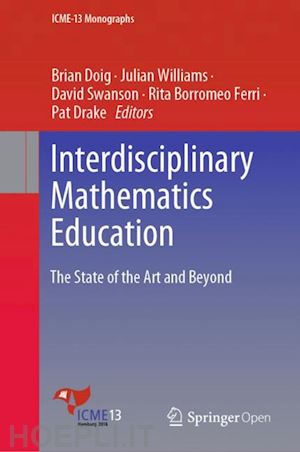
Questo prodotto usufruisce delle SPEDIZIONI GRATIS
selezionando l'opzione Corriere Veloce in fase di ordine.
Pagabile anche con Carta della cultura giovani e del merito, 18App Bonus Cultura e Carta del Docente
This open access book is the first major publication on the topic of “Interdisciplinary Mathematics Education” and arose from the work of the first International Topic Study Group of the same name at the ICME-13 conference in Hamburg in 2016. It offers extensive theoretical insights, empirical research, and practitioner accounts of interdisciplinary mathematics work in STEM and beyond (e.g. in music and the arts).
Scholars and practitioners from four continents contributed to this comprehensive book, and present studies on: the conceptualizations of interdisciplinarity; implementation cases at schools and tertiary institutions; teacher education; and implications for policy and practice. Each chapter, and the book itself, closes with an assessment of the most significant aspects that those involved in policy and practice, as well as future researchers, should take into account.
Introduction
Brian Doig, Deakin University
Julian Williams, University of Manchester
SECTION 1: CONCEPTUAL FRAMEWORKS
Julian Williams, University of Manchester (Section Editor)
Introduction
Julian Williams, University of Manchester
Theoretical Perspectives on Interdisciplinary Mathematics
Julian Williams, University of Manchester, and Wolff-Michael Roth, University of Vic, Canada
Interdisciplinary Collaboration Between Musicians and Mathematicians: An Experience with Stochastic Music
M. Alicia Venegas-Thayer, Pontifical Catholic University of Valparaiso
Challenges and Opportunities STEM Interdisciplinary Agenda
Russell Tytler, Linda Hobbs, Gaye Williams, & Julie Anderson, Deakin University
SECTION 2: FOCUS ON CROSS-CUTTING SKILLS
Pat Drake, Victoria University (Section Editor)
Introduction
Pat Drake, Victoria University
Using Scientific Hypothesis in Interdisciplinary Maths Activities
Andrzej Sokolowski, Lone Star College
Quantitative Reasoning and its Role in Interdisciplinarity from a Mathematical Perspective
Robert Mayes, Georgia Southern University
Modelling and Programming of Digital Video: A Source for the Integration of Mathematics, Engineering, and Technology
Carlos LópezLeiva, Marios Pattichis, Sylvia Celedón-Pattichis, University of New Mexico
SECTION 3: CASE STUDIES OF INTERDISCIPLINARITY IN PRACTICE
David Swanson, University of Manchester (Section Editor)
Introduction
David Swanson, University of Manchester
Mathematics in an Interdisciplinary STEM Course (NLT)
Den Braber, Krüger, Mazereeuw, & Kuiper
“Mathsadd up”: Interdisciplinary Maths Activities
Maite Gorriz, Santi Vilches, Fundació Jaume Bofill, Catalonia
The Successful Students STEM project: A Medium Scale Case of Teacher Development
Linda Hobbs et al., Deakin University
“Draw What You See”: Transcending The Mathematics Classroom
Signe E. Kastberg, Purdue University, Rachel Long, Central Elementary School Kathleen Lynch-Davis, Coastal Carolina University.
Interdisciplinarity: Old wine in new bottles?
Brian Doig Deakin University, Wendy Jobling, Deakin University.
SECTION 4: TEACHER EDUCATION AND TEACHER DEVELOPMENT
Rita Boromeo Ferri Section Editor
Introduction
Rita Borromeo Ferri, University of Kassel
Inclusion of Interdisciplinary Approach in Biology Teacher Trainees Mathematics Education in Slovakia
Ivana Bobonová, Sona Ceretková, Constantine the Philosopher University in Nitra, Slovakia
Preparing STEM Teachers as Researchers: A Research Experiences for Undergraduates ProJect
Jennifer Wilhelm, Molly H. Fisher, University of Kentucky
SECTION 5: CONCLUSION
IdME – a Conclusion
Brian Doig, Deakin University
Julian Williams, University of Manchester











Il sito utilizza cookie ed altri strumenti di tracciamento che raccolgono informazioni dal dispositivo dell’utente. Oltre ai cookie tecnici ed analitici aggregati, strettamente necessari per il funzionamento di questo sito web, previo consenso dell’utente possono essere installati cookie di profilazione e marketing e cookie dei social media. Cliccando su “Accetto tutti i cookie” saranno attivate tutte le categorie di cookie. Per accettare solo deterninate categorie di cookie, cliccare invece su “Impostazioni cookie”. Chiudendo il banner o continuando a navigare saranno installati solo cookie tecnici. Per maggiori dettagli, consultare la Cookie Policy.